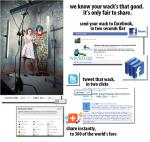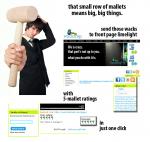What’s your story?
Share and find customer experiences
Connect with the people behind them
Wacktrap is
feedback made social
Trending Content
Pfizer Loses Lipitor Patent But Pays Millions to Cut Pharmacy Deals Blocking Generics
by editor

Pfizer is no dummy and its not giving up cash cow Lipitor. The pharmaceutical company is pretty much willing to pay people to keep out generics for as long as possible--and it's doing so in ways some consider underhanded by cutting deals with pharmacies that would literally block sale of alternate generics.
The branded cholesterol drug is the best-selling drug in history, even beating out Viagra. The manufacturer isn't willing to let go.
The drug manufacturer rakes in one-sixth of its overall revenue from the cholesterol medicine known as Lipitor. And it's got no replacement. While generic competition is slated to hit the United States within hours, Pfizer's not giving up the battle that easily: The company plans to make its branded prescriptions cheaper than generic alternatives -- at least for now, in efforts to get another six months out of the drug.
In an unusual move, Pfizer's been working on discounts and incentives being offered to patients, insurers and the companies that actually process those prescriptions -- all in the name of making the brand name drug literally as cheap or even cheaper than generic alternatives. And Pfizer is willing to pay to keep those profits, spending tens of millions in marketing to keep patients on Lipitor -- the drug that loses patent protection November 30.
It's usually a year or less after a patent has ended that other manufacturers grab market share. And that's when the company offering the branded version tends to move on. But Pfizer's got nothing to move on to right now -- so it plans to hang on.
At its peak Lipitor hit nearly $13 billion, now bringing in roughly $11 billion a year. Lipitor also represents about 13-percen of Pfizer's revenue. But while the company's planning to beat generics with pricing, it won't last forever. And it won't be forever before patients switch based on price alone. Right now the drug maker's involved in pharmacy or prescription incentives like $4 copay cards that guarantee prices over the next year -- through December 2012. That's less than one-fifth the cost of the average $25 co-pay for brand-name medicines, and well below the standard $10 co-pay for generic drugs. Basically Pfizer is making the branded drug cost less than half the non-branded. Along with advertising, the company's been making offers via its Pfizer website. Its also paying pharmacies to mail out those coupons for discounted copays -- sending them direct offers from Lipitor and the place that's filling the prescriptions.
The maneuvering may keep stock from plummeting.
It's a sneaky and smart strategy. And others may pick it up, to battle generics, if it proves effective. There's been some wheeling and dealing that could bring up some ethics questions. Reportedly Pfizer's been cutting some deals with insurance plans or companies that process prescription claims -- that may block pharmacists from dispensing generic forms of Lipitor. Rebates from the manufacturer brings down the dispensary cost for the branded drug, to match generic or cost even less, with an agreement to dispense solely Lipitor for at least six months before generic competitors slash pricing. The controversial deal means many of nearly 3 million American who use prescription Lipitor will be unable to switch to a generic alternative.
Not surprisingly the name of Wal-Mart continues to appear.
The Pfizer statement is interesting: "We want to make sure that patients... currently taking Lipitor and want to continue ... have the opportunity to do so," says the company's David Simmons who heads Pfizer's Established Products. Right. Well, apparently the company either wants to ensure patients have the opportunity -- or its working on ensuring branded Lipitor is their only opportunity, since many pharmacies won't be dispensing any generics and there won't be an option.
It's not uncommon for only about 10-percent of filled prescriptions to actually be the branded version, after generics have been on the market. Pfizer wants to make sure that's delayed for as long as possible for the medicine that only costs the drug maker about ten cents per mill to manufacture.
If what some perceive as an underhanded strategy works, Pfizer could actually increase earnings per share about 2-percent in 2012. And competitor-slash-partner Watson could be losing big-time, more than the pharmaceutical company intended. Watson cut a deal for distributing an "authorized generic" version made by Pfizer but actually stamped or sold under the Watson brand name. In the deal, Pfizer keeps about 70-percent on the pricing. But now that market of prescription users won't quite be available to the Watson company -- at least probably not in the numbers Watson expected.
The Watson CEO apparently expected Pfizer to retain about 25 percent of Lipitor users, one-fourth over the next half of a year -- but the estimate is now up to 45 percent, or nearly half the user base for the drug.
The only other slated manufacturer of generic Lipitor -- with rights to sell the drug nationally -- is India's Ranbaxy Laboratories. But manufacturing quality problems mean the company may not have FDA approval for immediate shipment, which may eliminate any secondary problem for Pfizer.
Location
SPEED UP YOUR ONLINE GROWTH
How To Wack
Take the Tour
Click on any image to start











